Speech Therapist
Entry Level Qualification
12
Career Fields
Medical Services
For Specially Abled


About Career
PARTICULARS | DESCRIPTION |
Name | Speech Therapist |
Purpose | Improves Your Ability To Talk |
Career Field | Medical Services |
Required Entrance Exam | NEET UG, AIIMS BSC |
Average Salary | 250000 - 400000 Rs. Per Year |
Companies For You | Speech and Language Therapy Clinics, Mayo Clinic & Many More |
Who is Eligible | Class 12th Pass |
1. Speech Therapists help and assist people with special needs to treat speech and voice impairment (stammering, cluttering, hoarseness, vocal palsy, delayed language, inappropriate pitch, etc.), swallowing disorders, or other factors.
2. They are also called Speech-Language Pathologists. Speech Pathologists not only help children and adolescents suffering from speech and language problems but also the elderly.
3. As a Speech and Language Therapist, you will have to develop remedial plans and modifications to existing therapy routines according to the patient’s response to your treatment methods. You will be involved in constant monitoring of your patient’s progress and recording it. You will have to write reports and maintain proper documentation of your treatment sessions.
4. You may have to use alternative communication systems at work (use of an alternative method/instrument to help a patient interact with you during therapy sessions). You can also be a bilingual Speech-Language Pathologist focusing on teaching use and articulation of 2 languages. You will also have to conduct regular research to constantly update your knowledge and to obtain factual information or authentic details before rendering any kind of treatment.
5. To practice as a Speech Therapist or Speech Language Pathologist in India, it is mandatory to register yourself in the Central Rehabilitation Register after obtaining a Degree or Diploma from an institution recognized by the Rehabilitation Council of India (RCI).
Key Roles and Responsibilities
As a Speech and Language Therapist, you will be engaged with one or more of the following roles and responsibilities: -
1. You will be developing or implementing treatment plans for problems like speech and voice impairment (stammering, cluttering, hoarseness, vocal palsy, delayed language, swallowing disorders, inappropriate pitch, etc.), difficulty in articulation or hearing impairment, voice/fluency disorders associated with mental retardation, cerebral palsy, other learning disorders or mental illnesses based on personal judgment and recommendations of physicians, psychologists, or social workers.
2. You will be administering speech and language or hearing tests, examinations, or evaluations to your patients for collecting information on the nature and degree of impairments, using oral or written tests and special instruments.
3. You will be instructing clients in techniques and methods such as sign language, lip reading, voice improvement, controlling or strengthening face muscles, jaw, tongue, educational or therapeutic games, or breathing mechanisms to help them communicate more effectively.
4. You will be evaluating speech and language or hearing test results, medical or background information, or barium swallow results, to diagnose and map further treatment plans for speech, fluency, language, swallowing, or voice disorders.
5. You will be constantly monitoring your patient’s progress and recording it, writing reports, and maintaining proper documentation of your treatment sessions.
6. You will be developing alternative communication or diagnostic strategies, remedial plans, and modifications to existing therapy routines according to the patient’s response to your treatment methods.
7. You will be consulting with and advising medical staff or educators on hearing or speech-related topics, such as language, voice, speech stimulation, or communication strategies.
8. You will be arranging group or individual programs or activities in schools, resource units attached to regular schools, hospitals, rehabilitation homes, special schools, industrial sets ups, etc. to deal with speech, behavior, language, voice, fluency, or swallowing problems associated with mental retardation, cerebral palsy, other learning disorders or mental illnesses.
9. You will be arranging for counseling programs to educate patients and their families regarding effective communicative techniques or strategies to prevent personal and social misunderstandings.
Career Entry Pathway
Class 10 all subjects as per the scheme of studies – Class 11-12 Physics, Chemistry, and Biology along with any other subject as per the scheme of studies – DHLS/ DSE / DTY.
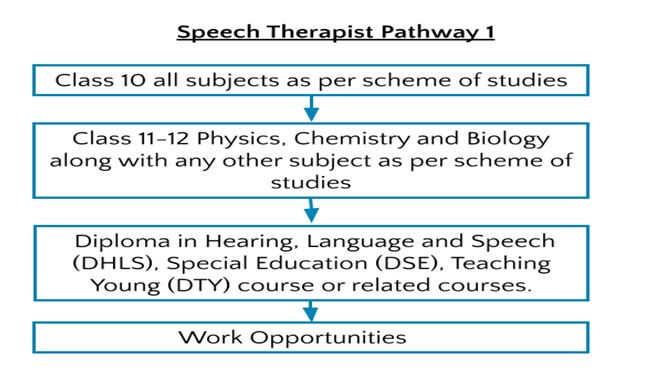
After completing Class 10 all subjects as per the scheme of studies and Class 11-12 Physics, Chemistry, and Biology along with any other subject as per the scheme of studies, you can go for a Diploma in Hearing, Lang, usage, and Speech (DHLS), Special Education (DSE), Teaching Young (DTY) course or related courses.
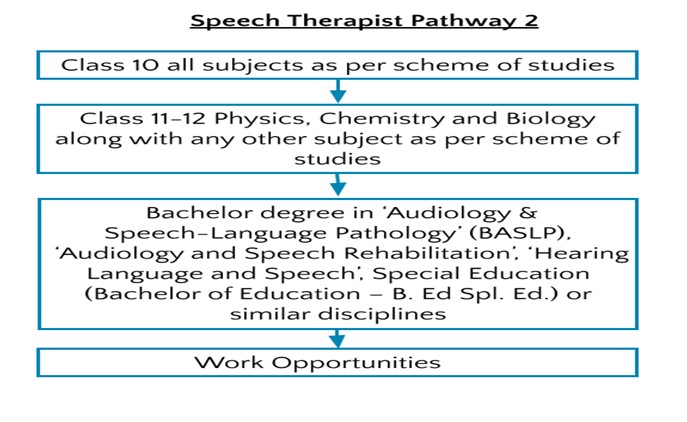
After completing Class 10 all subjects as per the scheme of studies and Class 11-12 Physics, Chemistry, and Biology along with any other subject as per the scheme of studies, you can go for a Bachelor's degree in ‘Audiology & Speech-Language Pathology’ (BASLP), ‘Audiology and Speech Rehabilitation’, ‘Hearing Language and Speech’, Special Education (Bachelor of Education – B. Ed Spl. Ed.) or similar disciplines. BASLP is usually a 4-year course.
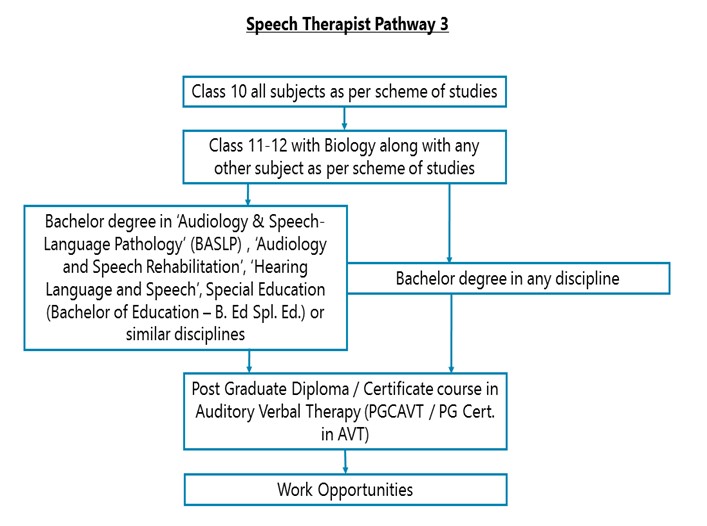
After completing Class 10 all subjects as per the scheme of studies and Class 11-12 Physics, Chemistry, and Biology along with any other subject as per the scheme of studies, you can go for a Bachelor's degree in ‘Audiology & Speech-Language Pathology’ (BASLP), ‘Audiology and Speech Rehabilitation’, ‘Hearing Language and Speech’, Special Education (Bachelor of Education – B. Ed Spl. Ed.)or similar disciplines. BASLP is usually a 4-year course. Then you can go for a Post Graduate Diploma / Certificate course in Auditory Verbal Therapy (PGCAVT / PG Cert. in AVT). This is usually 6 months. Graduates in any discipline holding a Diploma in Hearing, Language and Speech (DHLS), Special Education (DSE), Teaching Young (DTY) course can also go for Post Graduate Diploma / Certificate course in Auditory Verbal Therapy (PGCAVT / PG Cert. in AVT).
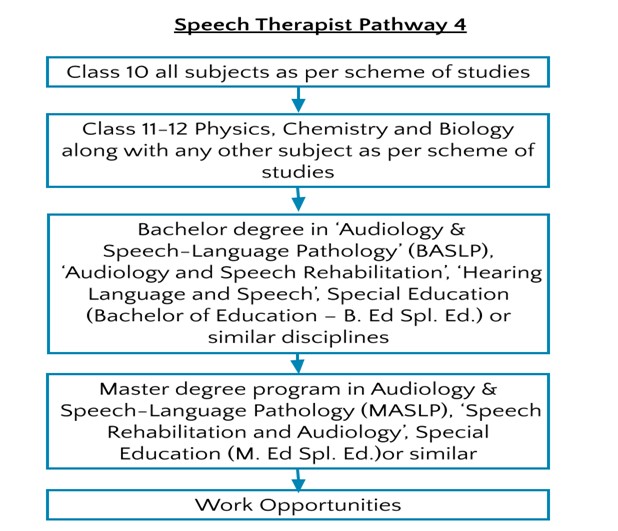
After completing Class 10 all subjects as per the scheme of studies and Class 11-12 Physics, Chemistry, and Biology along with any other subject as per the scheme of studies, you can go for a Bachelor's degree in ‘Audiology & Speech-Language Pathology’ (BASLP), ‘Audiology and Speech Rehabilitation’, ‘Hearing Language and Speech’, Special Education (Bachelor of Education – B. Ed Spl. Ed.) or similar disciplines.BASLP is usually a 4-year course. Then you can go for a Master's degree program in Audiology and speech-language Pathology (MASLP), ‘Speech Rehabilitation and Audiology’, Special Education (Master of Education – M. Ed Spl. Ed.), or similar disciplines.
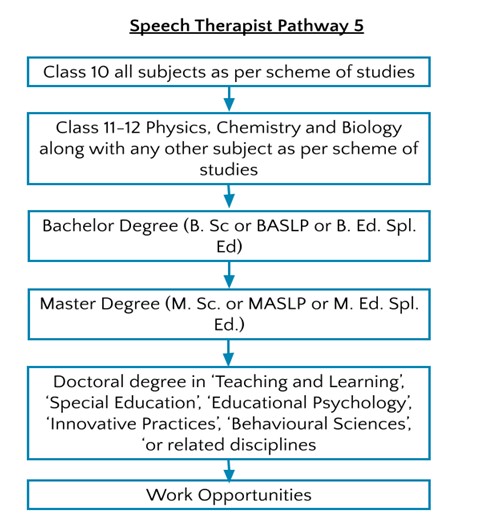
After completing Class 10 all subjects as per the scheme of studies and Class 11-12 Physics, Chemistry, and Biology along with any other subject as per the scheme of studies, you can go for a Bachelor's degree in ‘Audiology & Speech-Language Pathology’ (BASLP), ‘Audiology and Speech Rehabilitation’, ‘Hearing Language and Speech’, Special Education (Bachelor of Education – B. Ed Spl. Ed.) or similar disciplines.BASLP is usually a 4-year course. Then you can go for a Master's degree program in Audiology and speech-language Pathology (MASLP), ‘Speech Rehabilitation and Audiology’, Special Education (Master of Education – M. Ed Spl. Ed.), or similar disciplines. Then you can go for a Doctoral degree in ‘Teaching and Learning’, ‘Special Education’, ‘Educational Psychology’, ‘Innovative Practices’, ‘Behavioural Sciences’, ‘Special Educational Needs’, ‘Mental Health and Hygiene’, ‘Comparative Education’, ‘Guidance & Counselling’ or related disciplines.
Required Qualification & Competencies
After Class 11-12, you can go for:
1. Diploma courses.
2. Bachelor degree courses.
After your graduation, you can go for:
1. Post Graduate Diploma
2. Master level program.
If you are interested in furthering your educational qualifications, you can also go for:
1. Doctoral degree (Ph. D) in relevant areas of study after a Masters program.
Various private / public educational establishments offer the following or related courses:
1. Audiology Speech Language Therapy
MINIMUM EDUCATION REQUIRED | MAXIMUM EDUCATION REQUIRED |
Under Graduate Undergraduate Degree / Honours Diploma / Graduate Diploma (equivalent to a Degree) Programs for which the minimum eligibility is a pass in Higher Secondary / Class XII School Leaving examination. | Doctoral All Ph.D. or equivalent degree programs for which the minimum eligibility is a Postgraduate or a Pre-Doctoral degree. |
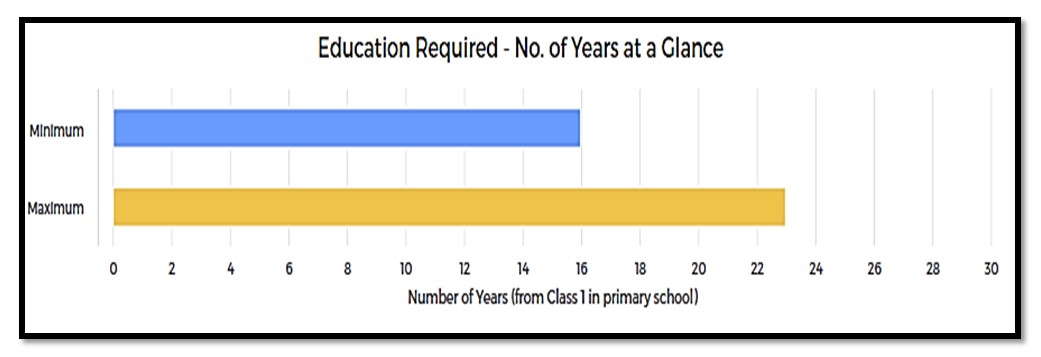
Competencies Required
1. You should have interests for Social Occupations. Social occupations involve helping or assisting others; these involve working with and communicating with people to provide various services; these may involve educating and advising others.
2. You should have Artistic occupations mostly involve working with creative ideas, ,and designs. These occupations involve abstract or conceptual thinking, creative self-expression and often do not follow any set processes or rules for getting things done.
3. You should have knowledge of Education and Training - various principles and methods of developing training or teaching curriculum, design of instructional methods, developing course materials, teaching and giving instruction individuals and groups.
4. You should have Instruction Skills - training others how to do something.
5. You should have Teaching Skills - teaching and educating others about various academic and applied subjects across different academic fields.
6. Talking effectively to a large group of people or an audience or addressing Public Speaking SkillsYou should have public at large in different settings such as conferences, seminars, meetings, etc.
7. Supervising and monitoring Supervising SkillsYou should have performance of others, businesses, and different projects.
8. You should have Active Listening Skills - Giving full attention to what other people are saying, understanding the points being made by others, asking questions, etc.
9. You should have Reading Comprehension Skills - Skills in understanding written sentences and paragraphs in work related documents.
10. You should have Critical Thinking skills- Skills in the analysis of complex situations, using logic and reasoning to understand the situations and take appropriate actions or make interpretations and inferences.
11. You should have Oral Comprehension Ability - listen to and understand information and ideas presented through spoken words and sentences.
12. You should have Oral Expression Ability - communicate information and ideas in speaking so others will understand.
13. You should have Deductive Reasoning Ability - apply general rules and common logic to specific problems to produce answers that are logical and make sense. For example, understanding the reasons behind an event or a situation using general rules and common logic.
14. You should have Speech and Language Recognition Ability - identify and understand the speech and language of another person.
15. You should have originality - The ability to come up with unusual or innovative ideas about a given topic or situation, or to develop creative ways to solve a problem.
16. You should have Fluency of Ideas - The ability to come up with a number of ideas about a topic (the number of ideas is important, not their quality, correctness, or creativity).
Career - Job Opportunities & Profiles
After your graduation, you are eligible to practice as an independent speech-language pathologist in:
1. Hospitals (in divisions like ENT, Neurology, Pediatrics, Plastic Surgery, Rehabilitation Medicine, and Preventive Medicine)
2. Speech and Hearing Centers
3. Schools For Children With Cerebral Palsy
4. Hearing Aid Industry
5. Mental Retardation, Hearing Impairment, and Child Guidance Centers
6. Industrial Setups
7. Training Programmes as supervisors and research assistants
8. Resource units attached to regular schools
After your Diploma, you can work as an assistants to speech-language pathologists and audiologists in:
1. Special Schools (for children with mental retardation, hearing impairment, etc.)
2. Clinics
3. Resource units attached to regular schools
4. District Disabilities Rehabilitation Centers
5. Rural Health Centers
Specialisation Tracks In This Career
1. Speech-Language Pathologist (Speech, Language and Swallowing)
Speech-Language Pathologists who specialize in language-based learning disorders or difficulties in the swallowing process help their patients facing problems associated with literacy impairments (to reading and writing), phonology (producing sound following the rules of a language), morphology (understanding words and modifications to their meanings), word-finding, syntax (following grammatical rules), structural language impairments, semantics (interpreting symbols or signs used in communication), pragmatics (social rules of communication) etc. Swallowing disorders like Dysphagia (difficulty in the swallowing process) and feeding disorders can occur at any age and can arise from multiple causes.
2. Speech and Vocal Training Specialist (Speech and Voice)
Speech and Vocal Training Specialists who specialize in resonance or voice problems (trouble with voice pitch, volume, and quality that are harmful to a patient’s professional or social performance), problems related to phonation (generating sound), fluency (ease in delivering information), resonance, intonation (variation in spoken pitch), vocal volume (hypophonia), pitch variance, hoarseness (dysphonia), poor abnormal vocal quality, etc. Most patients with Parkinson's disease develop speech and voice-related problems too.
3. Speech Therapist and Audiologist (Speech and Hearing)
A Speech Therapist and Audiologist who specializes in auditory or vestibular (includes parts of the inner ear connected to the brain) disorders that result in hearing issues, hearing loss, and speech impediments caused by a head injury, aging, viral infections, or other reasons help patients with technologies like psychoacoustics (how humans perceive various sounds), speech recognition through cochlear implants, sensory / hearing aids, etc.
Career Growth
From entry-level job positions, you may progress to assume responsibilities in a senior role leading a few trainers within a span of maybe 4-to 6 years. If you are in Academia, you may progress to become a full-time professor and later a Senior Lecturer or the Head of the Department in various universities. If you can build your clinic and widen your practice, your clinic may grow and expand to serve celebrity clientele too in a few years. You may also write books related to speech and hearing impairment and on allied topics addressing frequently asked questions of parents or patients in general.
Salary Offered
1. In entry-level jobs: you may expect about 20,000 – Rs. 25, 000 or more per month.
2. After having 1-6 years of experience, you may expect about Rs. 25,000 – Rs. 35, 000 per month or more.
3. After having 6-12 years of experience, you may expect about Rs. 35,000.00 – Rs. 70,000 per month or more.
4. In senior-level jobs, with 13+ years of work experience, you may expect to get about Rs. 50,000 – Rs. 1, 50,000 per month or even more depending upon your position and the company you are working with.
5. You can look forward to earning much more if you can set up your clinic to practice as an independent audiologist and speech-language pathologist helping people with special needs to treat speech impairment, mental retardation, hearing impairment, cerebral palsy, etc.
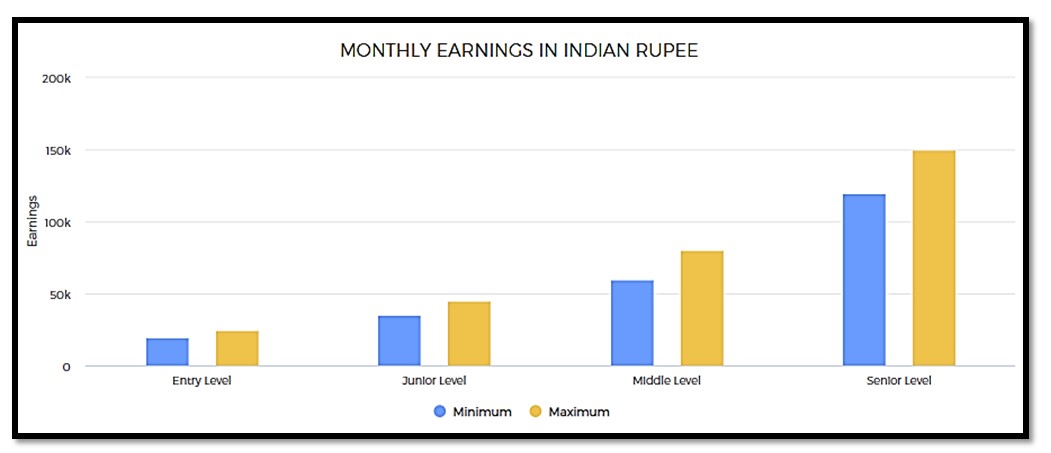
Monthly Earnings In Indian Rupee
Entry Level | Junior Level | Mid Level | Senior Level | ||||
Min Earning | Max Earning | Min Earning | Max Earning | Min Earning | Max Earning | Min Earning | Max Earning |
20000 | 25000 | 35000 | 45000 | 60000 | 80000 | 120000 | 150000 |
1. Entry level: 0 - 2 years of work experience
2. Junior Level: From 1 to 12 years of work experience
3. Mid Level: From 5 to 20+ years of work experience
4. Senior Level: From 10 to 25+ years of work experience (there could be exceptions in some high-end technical, financial, engineering, creative, management, sports, and other careers; also shortly, people will reach these levels much faster in many careers and some careers, these levels will have no meaning as those careers will be completely tech skill driven such as even now, there is almost no level in a Cyber Security Expert’s job)
Work Activities
1. Providing advice and consultation to others - Giving advice or consultation to others about various issues, conceptual matters, know-how, scientific matters, products, or services.
2. Training and teaching - Understanding the educational and training needs of others, developing training programs and educational programs, conducting training programs, teaching and instructing others.
3. Getting Information and learning - Observing, hearing, reading, using computers, or otherwise obtaining information and learning from it.
4. Working directly with people - Working directly with people to offer them products and services, assisting, etc.
5. Assisting and caring for people - Assisting people in availing of services; taking care of people in different situations; offering help and services to others.
6. Performing for people - Performing various tasks for people to help them, and assist them.
7. Developing and maintaining interpersonal relationships - Developing professional relationships with co-workers and others outside organizations and maintaining good relationships.
8. Inspecting situations, events, and people - Inspecting situations, events, and people to understand the reasons and causes for the situation or events to happen; inspecting people to understand reasons behind their behavior and actions.
9. Analysing and interpreting data and information - Analysis of data and information to find facts, trends, reasons behind situations, etc.; interpretation of data to aid in decision-making.
10. Processing information - Compiling, tabulating, calculating, auditing, verifying, or otherwise dealing with information processing including data entry, transcription, recording, storing, and maintaining databases.
11. Making decisions and solving problems - Analysis of data and information; evaluation of alternative decisions and results of decisions; taking the right decisions and solving problems.
12. Updating and using relevant knowledge - Keeping updated with the latest knowledge relevant to your fields of work and using the relevant knowledge in getting things done.
13. Using computers for work - Using computers for day-to-day office work; using computer software for various applications in day-to-day professional work; entering data and processing information; for writing.
Future Prospects
1. The road ahead for this career pathway seems uphill. The Healthcare Market in India has the potential to increase 3 fold to 133.44 billion US Dollars. Indian Government is willing to expand public health spending to 2.5% of GDP by 2025. Pradhan Mantri Jan Arogya Yojana (PMJAY) launched in 2018 provides 7,124.54 US Dollars each to over 100 million families every year.
2. The major focus is on quality of service and hence skilled labor is much required to sustain the growth of this industry.
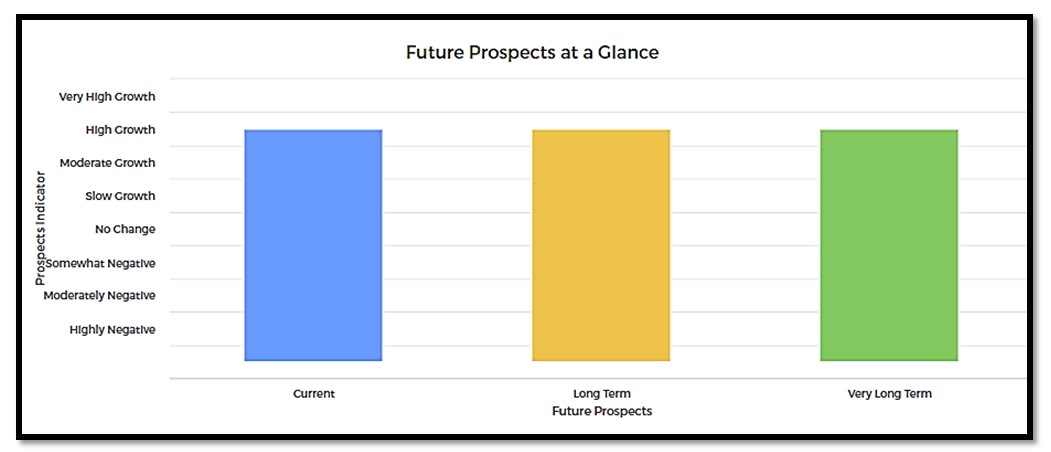
Future Prospects At A Glance
Current (0-1 year) | Long Term (2-5 years) | Very Long Term (6-10 years) |
High Growth | High Growth | High Growth |


